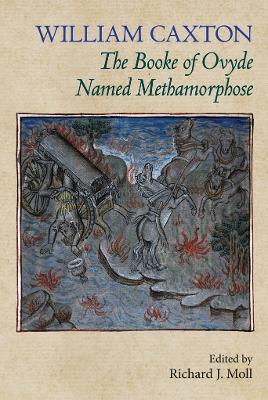British Writers of the Middle Ages and the Early Modern Period
1 primary work
Book 4
The first English translation of Ovid's Metamorphoses was the work of William Caxton, not just England's first printer but also a successful merchant, diplomat, and one of the most prolific translators of the fifteenth century. Extremely popular in the late Middle Ages, the stories in the Metamorphoses featured in works by Chaucer, Gower, and Lydgate.
Caxton's translation, which survives only in a single manuscript now in Magdalene College, Cambridge, was made not from the original Latin but from a prose version of the French Ovide moralise, a chivalric adaptation which includes allegorical and historical interpretations of the fables as well as additional classical tales. In the fifteenth century, Burgundian chivalric taste influenced the proliferation of the prose romance, and this genre was, in turn, sought as the height of English literary fashion. The Booke of Ovyde is thus a perfect example of how Caxton both reflected and influenced literary tastes of his day.
This critical edition, the first of the entire work, seeks to encourage the study of Caxton's Ovyde, both as an example of the late-medieval mise en prose and as a significant part of Caxton's considerable oeuvre. It also serves as an entry point into the complex textual tradition of medieval Ovidian commentaries.
Caxton's translation, which survives only in a single manuscript now in Magdalene College, Cambridge, was made not from the original Latin but from a prose version of the French Ovide moralise, a chivalric adaptation which includes allegorical and historical interpretations of the fables as well as additional classical tales. In the fifteenth century, Burgundian chivalric taste influenced the proliferation of the prose romance, and this genre was, in turn, sought as the height of English literary fashion. The Booke of Ovyde is thus a perfect example of how Caxton both reflected and influenced literary tastes of his day.
This critical edition, the first of the entire work, seeks to encourage the study of Caxton's Ovyde, both as an example of the late-medieval mise en prose and as a significant part of Caxton's considerable oeuvre. It also serves as an entry point into the complex textual tradition of medieval Ovidian commentaries.
